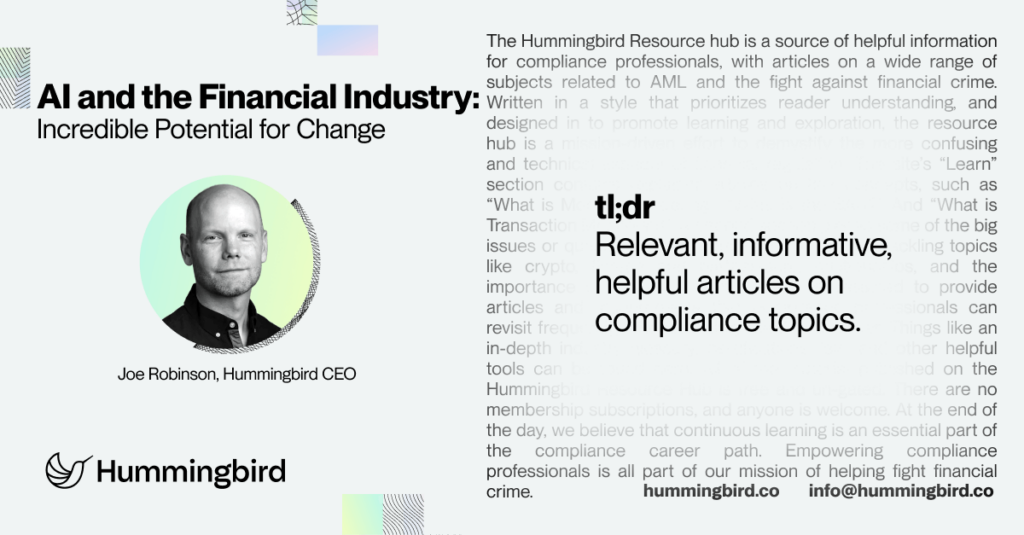Hummingbird CEO on AI in Finance: There's Incredible Potential for Change

By Joe Robinson, Hummingbird CEO (Originally posted on Hummingbird blog)
AI is on everyone’s minds. ChatGPT and other generative AI's sophistication and availability have businesses speculating how they can apply the tech to their organizations to innovate and grow. But while there are several possible applications, many companies are hesitant to be the first to go all in on new tech, especially in finance, where mistakes can be costly.
I’ve always been a tech optimist, and I’m passionate about finding new ways for tech to improve our lives and the finance industry. That passion drove me to co-found Hummingbird. And I think AI has massive potential to make a profound impact.
Increasing Broader Financial Literacy for All
AI stands to make a significant difference for everyone by helping people improve their financial health. Personal finance in general is overwhelming and complex, and many don’t know where to start to better their understanding of saving and investing.
Most will turn to search engines to ask basic questions, but they’re hit with walls of links and left to try to understand a deluge of information on their own. They have to wade through websites built for SEO or riddled with ads, and in the end, may not walk away with helpful information.
But if financial institutions were to implement something like ChatGPT, that same person could open a chat, start a conversation about a financial topic, and receive advice that sounds like it’s coming from a trusted advisor or friend. Fast, expert advice that can actually be applied and followed. And it would be easy to ask follow-up questions. Let’s say you wanted to know what an index fund is; you could ask that question and then ask related questions about different types of index funds, why they’re a recommended strategy over mutual funds or other types of investments, etc.
In addition to benefiting customers of financial institutions, generative AI also has the potential to transform the jobs of the teams within those organizations.
The Potential for an AI-Powered Compliance Assistant
AI can simplify the lives of finance and compliance professionals with powerful solutions to automate the collection and processing of financial data, various workflows, and more.
ChatGPT for Narratives
Intelligent assistants are a possible application of this automation and could be game-changing. When compliance professionals are asked, “How would you use ChatGPT?” many say they would use it to write their narratives. Currently, the technology is quite good at writing thorough narratives that are the right length, per FinCen guidelines. We’ve been thinking about this at Hummingbird and how we could potentially, sometime down the line, include a digital assistant in our platform that would help investigators write their narratives. It could significantly improve SAR filing times by eliminating one of the most tedious parts of the process while also improving communication between investigators and law enforcement.
Customer Diligence Assistant
What if you could use AI for KYC/KYB? ChatGPT is very adept at pulling lots of information from different docs and the web and cross-tabulating it, bringing the information together, and summarizing it. Imagine being able to collect information from a variety of sources and forms, then using ChatGPT to summarize that information for you rather than having to keep track of everything that’s spread across three or four different documents. You could remain compliant with your due diligence process while working smarter and faster.
AI-Guided Investigations
We also recently launched our app store, Hummingbird Apps, to build a modular compliance solution that enables you to bring in the necessary applications and data sources that make sense for your business. I see a future where an intelligent assistant would recommend apps for investigators to use and how to investigate certain situations.
While the possibilities for AI are numerous, we also have to be careful about its potential to be abused by bad actors and consider how to get ahead of this.
The Need for Safeguards Against the Abuse of AI
Many experts are concerned about how AI could be misused and are calling for developing standards and guardrails to curb this. Some are even calling for OpenAI to stop its development of ChatGPT for commercial purposes, citing myriad ways in which it can be dangerous to the public, from providing instructions on how to commit and cover up crime to engaging in mass surveillance and more.
However, past experience has shown that it’s essential for those of us in finance and compliance to use and understand emerging tech to stay ahead of criminals. The blockchain, which has also been abused for crime, is now a key tool in AML investigations. We must simultaneously embrace AI while calling for powerful RegTech that will drastically reduce the ability to use AI criminally and maliciously.
Some Congressional leaders are advocating for governmental oversight of AI development, while the White House has released a blueprint for an AI Bill of Rights. While none of this is formal policy, they’re important steps towards protecting the public against abuse of AI without preventing further development of this incredible technology.
A Hopeful Look Ahead to the Future of AI
As compliance professionals, we can and should be embracing a wide range of tech to help us become more effective and efficient in our roles. We must constantly experiment and learn and be willing to go all in to see actual change. If we’re not using these technologies, we’re falling behind the criminals who are.
I think AI is positioned to be industry-changing, and by utilizing it to its fullest potential, we’re empowering ourselves to reach the fullest potential in our roles and help create a better, safer world.